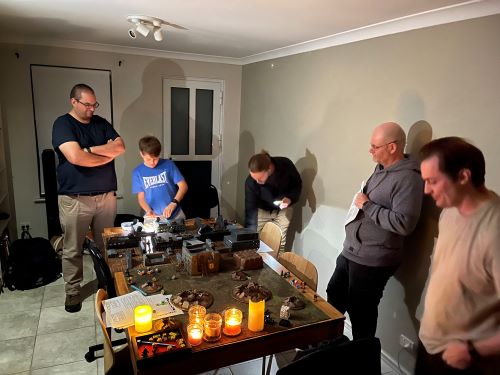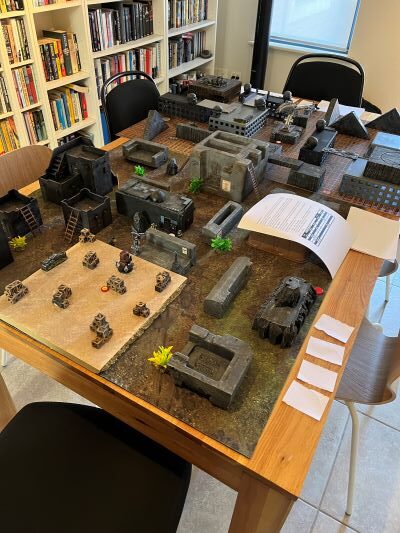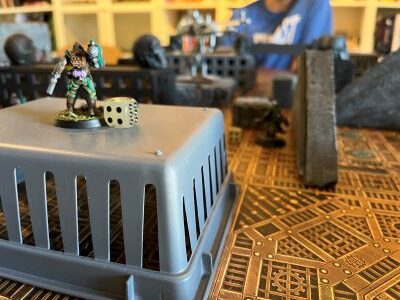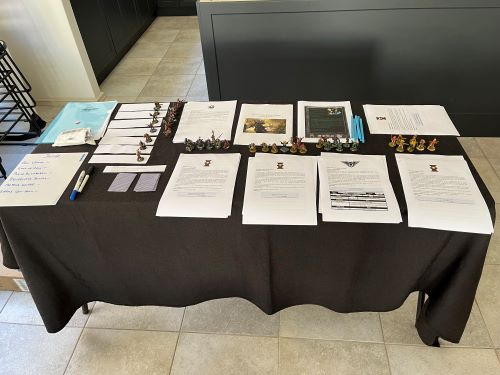Dungeons & Dragons (D&D) and other games like it, are praised for their ability to bring players together in a shared narrative. While individual character development and heroic moments are highlights, the real magic, at least from my perspective, lies in the collaborative storytelling and problem-solving that happens at the table. Emphasizing teamwork and communication not only enhances the experience but also ensures that players feel a strong connection to both the story and each other.
While writing this blog, I have also been developing a simple RPG ruleset that can be used in the workplace. (You can download a free working copy of Play to Lead and a sample adventure here.) I showed the draft to Rich, a very good friend of mine, and he made a great observation.
“If you’re writing a game to help encourage teamwork, why isn’t there a mechanic that encourages teamwork?”
I was gob smacked. Rich was absolutely right!
In an effort to improve Play to Lead I want to explore a few ideas that aid in the teamwork aspect of roleplaying games. While I am looking to incorporate some of these into my ruleset you can use these ideas to elevate the cooperative nature of your own games.
Team-Based Objectives
The first step would be designing scenarios and challenges where success depends on the entire team working together. For instance, create objectives that require multiple skill sets or abilities to complete, such as a puzzle that needs both intellectual and physical solutions. I’ve tried to incorporate this in the design of my adventure The Lost Temple. Each character has specific skills and equipment that need to be used together to complete the challenges.
As the Dungeon Master/designer it is important that no single character can resolve these objectives alone. Encourage players to discuss and strategize as a team, highlighting the value of each member’s contribution.
Synergy Bonuses
From the game mechanic point of view synergy bonuses are pretty simple to implement. Essentially, these are bonuses where characters gain extra benefits when they combine their abilities or work in tandem. For example, if one character uses a defensive ability while another attacks, they both receive a temporary boost to their effectiveness.
Dungeons and Dragons has an excellent mechanic already in place. When characters pool their resources or assist each other advantage is applied. That means you get to roll two dice and choose the best result. This is excellent in the context of that game. But for Play to Lead I want teamwork to be at the forefront. Therefore anyone who assists on a task gets to roll their dice. The highest roll from all participants then constitutes the final result. Hopefully players will look for interesting ways to work together to gain this bonus.
As a Dungeon Master make sure to provide visual or narrative feedback when these bonuses trigger, reinforcing the idea that collaboration leads to greater outcomes. Regardless of the system players must be aware of the mechanical advantage that teamwork gives them.

Shared Resources
Another idea is to implement a shared resource pool that players can draw from for special abilities or actions. This could be a pool of “teamwork points” that accumulates based on cooperative actions or successful team-based objectives. Having a physical pool of teamwork dice that actually gets bigger before their eyes could really keep the idea of teamwork front and center. The additional twist here is that the team have to agree when these additional dice get to be used.
When running your games encourage players to manage these resources together, discussing when and how to use them for maximum impact. This promotes communication and planning, making teamwork an integral part of gameplay.
Role-Based Interactions
When designing the adventure assign specific roles within the team that complement each other. These could includes a leader who provides direction, a scout who gathers information, and a support character who buffs others. These roles should be flexible but designed to work best when used in concert.
As an example, I’ve used this in my adventure Lost Temple which includes the roles below.
- Archaeologist – professor of the ancient world. Equipped with a lantern. Read hieroglyphics, understand artefacts, high level of knowledge
- Climber – working at heights professional. Equipped with a 50m rope. Climbing, ropework, high level of agility
- Engineer – technical specialist. Equipped with a shovel and axe. Construction, demolition, high level of practical know how
- Navigator – directional expert. Equipped with a compass. Map and compass skills, unerring sense of direction
- Pilot – helicopter pilot. Equipped with a lantern. Piloting vehicles of all types, radio use, electronics master
- Expedition Leader (optional) – no specialist skills. Equipped with a knife. Must facilitate the team working together
As you can see, each role has very distinct skills and equipment. Only by combining these skills together can the team hope to escape the lost temple.
For games where you aren’t providing the characters consider guiding players in choosing roles that suit their play style but also encourage them to think about how their character’s strengths can benefit the group. Make sure to create moments in the game where these roles can shine, showing the value of each position.
Communication Challenges
Create in-game challenges that require clear and effective teamwork and communication to overcome. For example, a puzzle that involves different players receiving different pieces of information that they must share and interpret together. The most simple of these could be a simple cypher or map split into multiple parts and the team need to work together to fit them together. Another idea would be to make the puzzle verbal. Players need to take it in turns to speak parts of the solution in the correct order to pass.
Use these challenges to subtly teach players about the importance of listening and sharing information. Encourage out-of-character discussion if needed, but make sure the challenge requires in-character communication to succeed. Using the children’s game “Chinese Whispers” to pass complicated messages between themselves could work really well in this instance.
Narrative-driven Collaboration
In addition to having team-based objectives for your scenarios consider designing narrative arcs that require the players to create plans together and execute them as a team. These could be heists, diplomatic missions, or large-scale battles where every character’s role is vital to the outcome. During these moments, focus on the story implications of teamwork. Highlight how their collaboration influences the world and the NPCs around them, making their teamwork feel impactful beyond the mechanics.
Final Thoughts on Teamwork
In Play to Lead, making teamwork and communication central to gameplay can turn a good game into a great one. Presently I have a teamwork mechanic in place. However, I’m going to spend more time thinking about how a team dice pool can be incorporated as I love the idea of having a physical representation of teamwork at the table. I’ll also make sure to have teamwork as a central theme to all future Play to Lead adventures.
Make sure to keep the ideas above in mind when designing your adventures. Having players working together makes for a much more satisfying experience.





